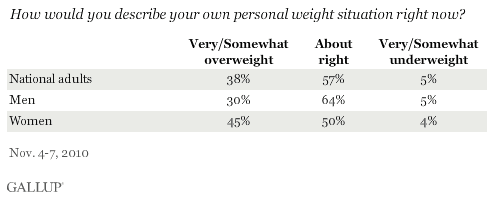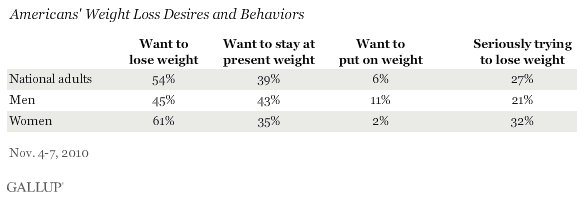WASHINGTON, D.C. -- More than 6 in 10 Americans weigh more than they would ideally like to, while fewer than 2 in 10 are at their ideal weight, according to their self-reports of how much they weigh. Few Americans are under their ideal weight. Americans, on average, report that they weigh 177 pounds, but would like to weigh 161.

Women weigh an average of 19 pounds more than their ideal and men an average of 12, based on self-reports of how much they weigh. Gallup's long-term trend on these measures has consistently found a bigger difference between the average woman's actual and ideal weight than there is for the average man.
These results are from Gallup's annual Health and Healthcare survey, conducted each November. The poll assesses Americans' attitudes about their weight and their weight-loss behaviors, and does not attempt to calculate obesity rates.
In separate Daily polling, Gallup tracks Americans' self-reported height and weight, and computes body mass index (BMI) scores, as part of the Gallup-Healthways Well-Being Index. These BMI calculations find that 62.6% of Americans are either overweight or obese (36% are overweight and 26.6% are obese) -- essentially matching the 62% who are overweight, according to self-reports of actual versus ideal weight.
Both figures, however, far exceed the percentage of Americans who personally describe themselves as overweight -- 38% in the Nov. 4-7 Health and Healthcare survey. The large majority of Americans describe their weight as "about right."

Americans who are slightly overweight by objective measures may be less likely to go so far as to describe themselves as overweight, which could be why there is such a great disconnect between the percentage who are over their ideal weight and the percentage who describe themselves as such. In fact, 22% of Americans are over their self-reported ideal weight by only 1 to 10 pounds. Additionally, Americans may be reluctant to use the word "overweight" to describe their situation, even if they acknowledge that their actual weight is higher than their ideal weight.
More Americans Want to Lose Weight Than Are Seriously Trying To
More than half of Americans (54%) say they want to lose weight, and 27% say they are seriously trying to do so. These figures are similar to those from past years.
Significantly, more Americans say they want to lose weight than describe themselves as overweight. This discrepancy may again point to Americans' reluctance to use the term "overweight" to describe their situation, even as they recognize that their actual weight is higher than their ideal weight, and acknowledge that they would like to lose weight.
Women tend to be more likely to want to shed extra pounds and take action toward that goal. Sixty-one percent of women say they would like to lose weight, compared with 45% of men. And more women than men -- 32% vs. 21% -- are seriously trying to lose weight.

The gender differences in weight-loss desires and intentions could reflect the higher percentage of women than men who exceed their reported ideal weight, but are also likely the result of societal norms or social pressures about weight and body image that are different for men than for women, or perhaps affect men and women differently.
Bottom Line
While the majority of Americans weigh more than their ideal and say they would like to lose weight, a minority report that they are seriously trying to drop pounds. Historically, far more Americans have reported being over their ideal weight than have said they are making a serious attempt to lose weight. This perpetual disconnect underscores the difficulties many Americans face in trying to slim down. It also highlights one of the key problems in reducing obesity nationwide: Although many Americans are aware that they weigh more than they should, most are not taking action to make a change.
On the other hand, the 38% of Americans who choose to describe themselves as overweight is fairly close to the 27% who say they are seriously trying to lose weight. Indeed, 50% of those who say they are overweight also say they are seriously trying to lose weight -- so those who are more likely to need to lose weight are also more likely to be trying to do something about it.
Survey Methods
Results for this Gallup poll are based on telephone interviews conducted Nov. 4-7, 2010, with a random sample of 1,021 adults, aged 18 and older, living in the continental U.S., selected using random-digit-dial sampling.
For results based on the total sample of national adults, one can say with 95% confidence that the maximum margin of sampling error is ±4 percentage points.
Gallup surveyed 520 men and 501 women. For results based on gender, one can say with 95% confidence that the maximum margin of sampling error is ±5 percentage points.
Interviews are conducted with respondents on landline telephones (for respondents with a landline telephone) and cellular phones (for respondents who are cell phone-only). Each sample includes a minimum quota of 150 cell phone-only respondents and 850 landline respondents, with additional minimum quotas among landline respondents for gender within region. Landline respondents are chosen at random within each household on the basis of which member had the most recent birthday.
Samples are weighted by gender, age, race, education, region, and phone lines. Demographic weighting targets are based on the March 2009 Current Population Survey figures for the aged 18 and older non-institutionalized population living in continental U.S. telephone households. All reported margins of sampling error include the computed design effects for weighting and sample design.
In addition to sampling error, question wording and practical difficulties in conducting surveys can introduce error or bias into the findings of public opinion polls.
View methodology, full question results, and trend data.
For more details on Gallup's polling methodology, visit www.gallup.com.
